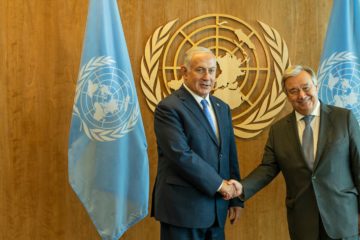OxPol BlogCast Episode 2: The Milk Tea Alliance
Welcome to the OxPol Blogcast, a podcast where we will be sharing research, analysis, and experiences from members of the University of Oxford’s Department of Politics and International Relations. On each episode, we will talk to a guest about a piece they’ve written for the OxPol Blog. Then, we’ll discuss their larger research agenda, their insights on conducting political science, and their time at Oxford. On the 2nd episode of the OxPol BlogCast, host Chase Harrison talks to MPhil students Jasmine Chia and Scott Singer about the Milk Tea Alliance and its relationship to 20th century black anti-colonialists. They also discuss the movement to decenter International Relations scholarship. Read the original blog post here: https://blog.politics.ox.ac.uk/the-new-worldmakers-how-the-20th-century-black-anticolonial-dialogue-reveals-the-strategic-importance-of-the-milk-tea-alliance/
The Crown’s Irresponsible Adviser, the Governor General, and the Australian Constitutional Crisis of 1975: A Smoking Gun?
On 14 July, following legal proceedings, the National Archives of Australia released correspondence between Sir John Kerr, who served as Governor General of Australia from 1974–77, and Sir Martin Charteris, the Principal Private Secretary (PPS) to the queen. The letters concern Kerr’s decision to dismiss Gough Whitlam, the Labor Prime Minister, who was then locked in a battle between the House of Representatives, where he held a majority, and the Senate, which opposed him and was blocking supply (the federal budget). Leading scholars, such as Anne Twomey, as well as Buckingham Palace, have argued that the letters contain no smoking gun connecting Kerr’s actions to the monarch or her PPS. However, we believe that we can see a wisp of smoke. And it lingered. Kerr and Charteris …
The New ‘Worldmakers’: How the 20th Century Black Anticolonial Dialogue Reveals the Strategic Importance of the Milk Tea Alliance
Growing tension in Berlin. A proxy war in Korea. The escalating Space Race. The world—and particularly its realists—focused on the evolving great power competition between the United States and Soviet Union during the Cold War. However, in the shadows of this marquee battle, black leaders such as Kwame Nkumrah, Eric Williams, and George Padmore drove an anticolonial dialogue that sought to transform the international order on their own accord. Their core mission: to reframe sovereignty, reconceptualising it as self-determination and the elimination of racial hierarchy. This weighty conversation, which took place from the 1950s to the 1980s, doesn’t seem related to an Asian meme war in 2020. However, amidst a new, growing Cold War between the U.S. and China, the ‘Milk Tea Alliance’ has emerged as the newest supranational …

The Global Inequity of Emissions Consumption: Carbon Accounting as the Future Stepping-Stone in International Climate Negotiations
As the host of the postponed COP26 climate summit, the UK has set out the ambitious goal to convince all countries to commit to reach net zero emissions as soon as possible within their mandatory climate targets. Reducing overall emissions remains the paramount task of global climate governance. However, an overlooked but defining question concerns carbon accounting—the methodology of how national CO2 emissions are assessed. The conventional territory-related production approach, which has traditionally been used in climate governance, stands in contrast to an often ignored consumption-based approach, which more closely captures emissions embodied in the domestic end-use of energy and goods. This article lays out why the seemingly dull and technical matter of carbon accounting has the potential to become the future stepping-stone for a global consensus on …

Is The Charter Cities Moment Here?
In 2009, Nobel Prize laureate and former Chief Economist of the World Bank Paul Romer proposed the concept of ‘charter cities.’ In contrast to special economic zones, charter cities were envisaged as quasi-sovereign units located within existing states which were to be maintained by a foreign guarantor nation or nations. This arrangement would not merely construct a separate economic framework for the designated territory, but also establish a legal and political system autonomous from the host state. This, Romer believed, would create city-scale epicentres to stimulate economic development within the Global South. This piece examines Romer’s project and questions the immediate feasibility of such a project by taking into account the ‘stickiness’ of ideas regarding the territorial sovereign state. Since 2009, the idea of charter …

‘Uniting for Peace’ Against Israel’s Annexation Plan
With the diversion of Israel’s military resources towards West Bank, Israeli annexation of occupied Palestinian territory appears imminent, pending approval from and coordination with the American administration. Struggling to rally right-wing voters amidst the fight for his political survival in the elections of April, September 2019 and March 2020, Prime Minister Benjamin Netanyahu had stated that he would “apply Israeli sovereignty” over the West Bank, if re-elected. Bolstered by the reversal of decades of American policy on the issue and the subsequent release of Trump’s much criticized, one-sided ‘Middle East Peace Plan’ in January 2020, Netanyahu has aggressively pursued the annexation agenda with the emergency government formed with Benny Gantz in March 2020. Considering the expected blockage of the Security …

Lockdown and the Climate Crisis
In 2020, lockdowns around the world have reduced energy use and carbon emissions on an unprecedented scale. However, the current COVID-19 outbreak may be a double-edged sword in the fight against climate change. Individual countries are imminently due to report their carbon reductions, as outlined in the United Nations-brokered Paris Agreement. Although pre-Coronavirus crisis global greenhouse gas (GHG) emissions are expected have grown by 1.9%, recent CO₂ calculations in Europe are predicting a surprising scenario: countries may actually hit their stated reduction goals. For instance, the German climate target for 2020, which until February was considered unattainable, should now be met. Due to this year’s mild winter, and, above all, the Coronavirus crisis, the target of 40% CO₂ savings—unlike climate change targets …
Have We Finally Moved Past the Unilateral Age of Apollo? The Artemis Accords, Explained
The United States, under the Trump administration, has aimed to excite interest in space activities, including through the highly publicised creation of the Space Force and the manned space flight missions with SpaceX. Importantly, the announcement of the Artemis Accords in mid-May is an extension of such an effort. The Accords are envisioned as a set of bilateral agreements with the intent to return astronauts to the moon and beyond. Led by the United States and a series of commercial and international partners, they mark a seminal development in the outer space governance regime. As the United States and its international partners venture to create and strengthen outer space governance, non-space faring nations must be included in future agreements to ensure they are not systematically excluded from accessing lunar resources and development opportunities. The Artemis Accords program is spearheaded by the National Aeronautics …









